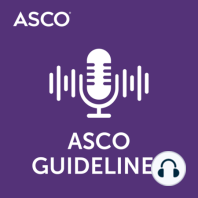12 min listen
Management of Dyspnea in Advanced Cancer Guideline
FromASCO Guidelines
ratings:
Length:
12 minutes
Released:
Feb 22, 2021
Format:
Podcast episode
Description
An interview with Dr. David Hui from MD Anderson Cancer Center and Dr. Margaret L. Campbell from Wayne State University, co-chairs on “Management of Dyspnea in Advanced Cancer: ASCO Guideline.” This guideline outlines a hierarchical approach to dyspnea management, beginning with identifying and managing potentially reversible causes, followed by the use of non-pharmacologic interventions, and then pharmacologic interventions. Read the full guideline at www.asco.org/supportive-care-guidelines TRANSCRIPT SPEAKER: The purpose of this podcast is to educate and to inform. This is not a substitute for professional medical care and is not intended for use in the diagnosis or treatment of individual conditions. Guests on this podcast express their own opinions, experience, and conclusions. The mention of any product, service, organization, activity, or therapy should not be construed as an ASCO endorsement. BRITTANY HARVEY: Hello, and welcome to the ASCO Guidelines Podcast Series, brought to you by the ASCO Podcast Network, a collection of nine programs covering a range of educational and scientific content and offering enriching insight into the world of cancer care. You can find all the shows, including this one, at podcast.asco.org. My name is Brittany Harvey, and today I'm interviewing Dr. David Hui from MD Anderson Cancer Center in Houston, Texas, and Dr. Margaret Campbell from Wayne State University in Detroit, Michigan, co-chairs on "Management of Dyspnea in Advanced Cancer: ASCO Guideline." Thank you for being here, Dr. Hui and Dr. Campbell. DR. DAVID HUI: Thank you. It's wonderful to be here. DR. MARGARET CAMPBELL: Yeah, it's my pleasure. BRITTANY HARVEY: First, I'd like to note that ASCO takes great care in the development of its guidelines and ensuring that the ASCO conflict of interest policy is followed for each guideline. The full conflict of interest information for this guideline panel is available online with the publication of the guideline in the Journal of Clinical Oncology. Dr. Hui, do you have any relevant disclosures that are directly related to this guideline topic? DR. DAVID HUI: I have no relevant disclosures. BRITTANY HARVEY: Thank you. And Dr. Campbell, do you have any relevant disclosures that are related to this guideline topic? DR. MARGARET CAMPBELL: No, I do not have any relevant disclosures. BRITTANY HARVEY: Thank you. Then let's get into some of the guideline content. So first, Dr. Hui, can you give us a general overview of the purpose of this clinical practice guideline? DR. DAVID HUI: Yeah. This clinical practice guideline is on dyspnea in patients with advanced cancer. And this symptom of shortness of breath, or dyspnea, is very common in our patients and extremely distressing. And the evidence base is rapidly evolving, so the purpose of this guideline is then to summarize the up-to-date information and provide some recommendations for clinical practice to help alleviate this very challenging symptom. BRITTANY HARVEY: Great. Then let's review some of those key recommendations of this guideline. So Dr. Campbell, what is recommended for screening and assessment of dyspnea in patients with advanced cancer? DR. MARGARET CAMPBELL: Well, as David mentioned, this is a highly prevalent symptom. But we know that in clinical practice, sometimes patients won't disclose their symptom unless they're asked. And it gives us an opportunity to be certain that we don't overlook the symptom, particularly when it's in the early stages, mild or moderate stages, where we can intervene rapidly. So in order to treat a symptom, we have to know that the symptom exists. So in the guideline, we recommend at every clinical encounter that there be an assessment for dyspnea. So every clinical encounter could be every time the patient presents in the outpatient clinic, or it could be every day if the patient is an inpatient. Every day on rounds, or every time vital signs are obtained, there would be an assessment of
Released:
Feb 22, 2021
Format:
Podcast episode
Titles in the series (100)
Adjuvant Endocrine Therapy for Women with Hormone Receptor Positive Breast Cancer Guideline: An interview with Dr. Jennifer Griggs from University of MIchigan on Adjuvant Endocrine Therapy for Women with Hormone Receptor Positive Breast Cancer: ASCO Clinical Practice Guideline Focused Update. This guideline provides recommendations on... by ASCO Guidelines
